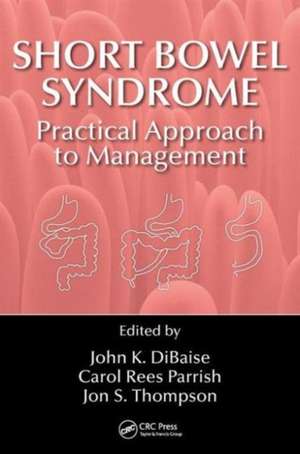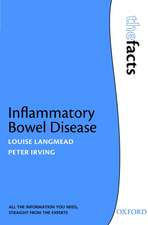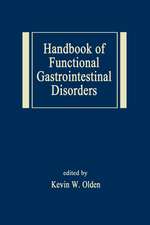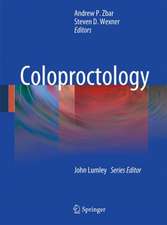Short Bowel Syndrome: Practical Approach to Management
Editat de John K. DiBaise, Carol Rees Parrish, Jon S. Thompsonen Limba Engleză Hardback – 15 iun 2016
The use of growth factors, which is likely in the future to become increasingly important in promoting intestinal structural adaptation, is extensively discussed. Special emphasis is given to the psychosocial aspects of the quality of life of patients, including support groups. Emphasis is also given to the importance of an experienced multidisciplinary team in caring for these patients.
This book is particularly timely given the recent advances in the management of Short Bowel Syndrome, including the availability of pharmacologic agents to enhance intestinal absorption, refinements in parenteral nutrition, and surgical procedures designed to eliminate the need for parenteral nutrition support.
The goal of this international, interdisciplinary book is to bring the subject of Short Bowel Syndrome to a wide audience. A wide range of specialists have contributed to this book to provide various viewpoints on the state-of-the-art care of those with this condition.
Preț: 1290.71 lei
Preț vechi: 1574.03 lei
-18% Nou
Puncte Express: 1936
Preț estimativ în valută:
247.00€ • 256.41$ • 205.96£
247.00€ • 256.41$ • 205.96£
Carte tipărită la comandă
Livrare economică 22 martie-05 aprilie
Preluare comenzi: 021 569.72.76
Specificații
ISBN-13: 9781498720786
ISBN-10: 1498720781
Pagini: 440
Ilustrații: 103
Dimensiuni: 178 x 254 x 29 mm
Greutate: 0.98 kg
Ediția:1
Editura: CRC Press
Colecția CRC Press
ISBN-10: 1498720781
Pagini: 440
Ilustrații: 103
Dimensiuni: 178 x 254 x 29 mm
Greutate: 0.98 kg
Ediția:1
Editura: CRC Press
Colecția CRC Press
Public țintă
Academic and Professional ReferenceCuprins
Short Bowel Syndrome: Definition, Classification, Etiology, Epidemiology, Survival, and Costs. Psychological, Social, and Quality of Life Considerations in Short Bowel Syndrome. Short Bowel Syndrome: Anatomical and Physiological Considerations. Intestinal Adaptation: The Contemporary Treatment Goal for Short Bowel Syndrome. Diarrhea in Short Bowel Syndrome. Electrolyte and Acid-Base Disturbances. Cholelithiasis and Nephrolithiasis. Metabolic Bone Disease in Adults with Short Bowel Syndrome. Clinical and Nutritional Assessment in the Patient with Short Bowel Syndrome. Diet Considerations in Short Bowel Syndrome. Maintaining Hydration in the Short Bowel Patient. Vitamins: Supplementation and Monitoring. Management of Trace Elements in Short Bowel Syndrome. Enteral Feeding in Short Bowel Syndrome. Parenteral Nutrition for Short Bowel Syndrome: Practical Aspects. Drug Delivery and Bioavailability in Short Bowel Syndrome. The Role of Antimotility and Antisecretory Agents in the Management of Short Bowel Syndrome. Luminally Active Therapies: Pancreatic Enzymes, Bile Acids, Bile Acid Binders, Antimicrobials, Probiotics, and Prebiotics in Short Bowel Syndrome. Glucagon-Like Peptide-2 in Short Bowel Syndrome. Utility of Growth Hormone and Other Potential Agents to Restore Enteral Autonomy in Short Bowel Syndrome. Surgical Considerations in the Short Bowel Syndrome. Ostomy, Fistula, and Skin Management. Autologous Gastrointestinal Reconstruction. Intestinal Transplantation. Home Parenteral Nutrition Initiation, Monitoring, and Weaning. Intestinal Failure-Associated Liver Disease. Central Venous Catheter Complications: Management and Prevention. Meeting the Unmet Needs of Home Parenteral and Enteral Nutrition Consumers: Education, Networking, and Support. Patient and Caregiver Perspectives: Learn and Live!
Notă biografică
Edited by
John K. DiBaise, MD, professor, Mayo Clinic, Scottsdale, Arizona, USA
Carol Rees Parrish, MS, RD, University of Virginia Health System, Charlottesville, USA
Jon S. Thompson, MD, professor of surgery, University of Nebraska Medical Center, Omaha, USA
John K. DiBaise, MD, professor, Mayo Clinic, Scottsdale, Arizona, USA
Carol Rees Parrish, MS, RD, University of Virginia Health System, Charlottesville, USA
Jon S. Thompson, MD, professor of surgery, University of Nebraska Medical Center, Omaha, USA
Descriere
The management of patients with Short Bowel Syndrome (SBS) is complex and requires a multidisciplinary approach including management of fluid, pharmacological agents, co-morbid disease, dietary/hydration, and occasionally, surgery. An understanding of the physiological alterations that occur in SBS is useful to understand the treatments employed for this condition. This book discusses these physiological alterations along with the roles of oral diet and fluid modifications, enteral and parenteral nutrition support, medications including trophic factors and surgical options.






